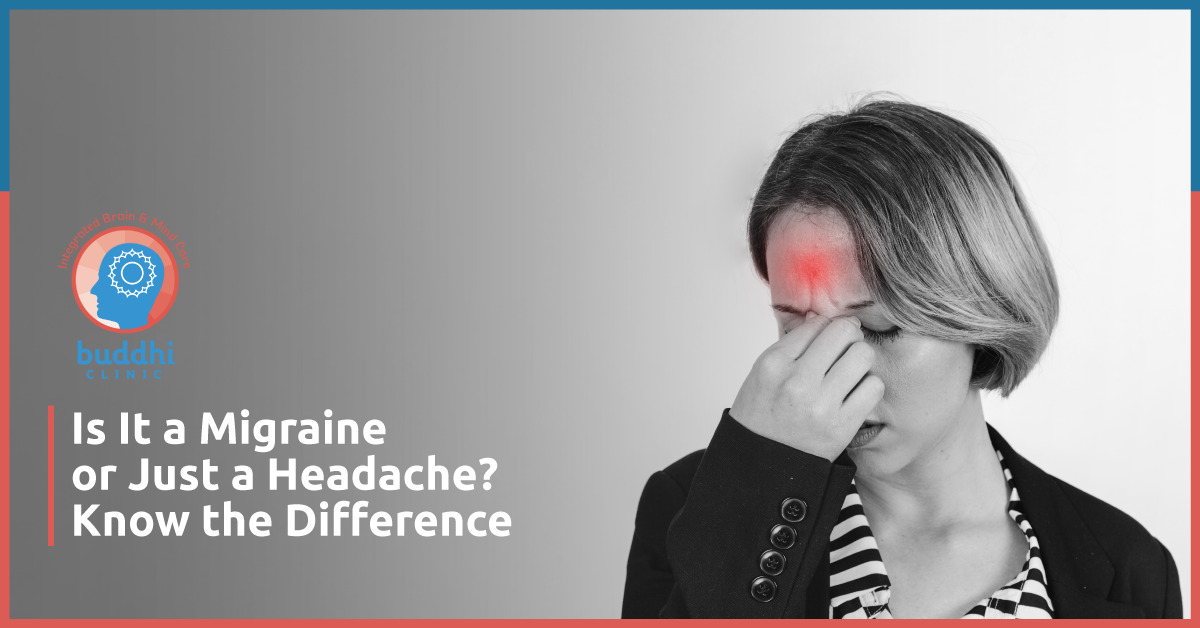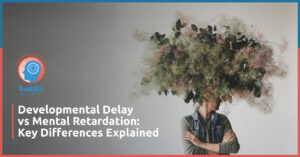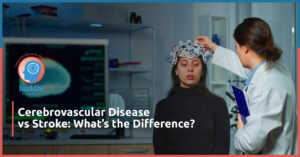Introduction
Headaches vs migraines are prevalent conditions that affect millions of individuals globally. Although they have some similarities, migraines are much more severe and complicated than average headaches. Most people confuse a migraine with a bad headache, resulting in incorrect diagnosis and inappropriate treatment.
Understanding the differences between a headache and a migraine will enable you to better cope with symptoms and receive the right medical care. This blog briefly addresses the key differences between the two, including shared triggers, symptoms, and more extensive treatments available at Buddhi Clinic.
If you experience repeated disabling chronic headaches, it is useful to understand the difference in order to prevent occurrences in the future and improve your well-being as a whole.
What Is a Migraine?
A migraine is a recurring neurological disorder that consists of severe, throbbing headache pain, often accompanied by nausea, visual disturbances, and sensitivity to light and noise. Unlike typical headaches, migraines are not only episodic but are also prolonged and can last from a few hours to several days.
The stages of a migraine typically progress through four phases:
1. Prodrome (Early Warning Symptoms)
This stage is hours or days before the migraine attack and includes:
- Mood swings (irritability or depression)
- Fatigue or unusual energy
- Craving for some foods
- Frequent yawning
2. Aura (Neurological Symptoms Before Pain)
Symptoms of aura appear before or at the same time as a migraine, resulting in vision and coordination issues:
- Blind spots or flashing lights
- Tingling in the face or arms
- Speech difficulties or confusion
3. Migraine Attack (Phase of Peak Pain)
The most severe phase, which lasts 4 to 72 hours, and consists of:
- Throbbing, unilateral head pain
- Nausea and vomiting
- Intolerance to noise, light, and odors
4. Postdrome (Phase of Recovery)
After the migraine attack is over, there are residual symptoms that last for days, including:
- Fatigue and weakness
- Difficulty concentrating
- Generalised discomfort
Migraines are disabling and affect daily functioning, work, and social relations. Proper diagnosis and treatment must be used to treat symptoms effectively.
Migraine vs Headache – Is It a Migraine or Just a Headache? Know the Difference
1. Understanding Headaches
Headaches are diffuse pain that can be light or severe but lack the neurological complexity of migraines. The most usual are:
- Tension Headaches: tension, muscle strain, or poor posture. They produce dull, throbbing pain on the forehead and temples.
- Cluster Headaches: in clusters and produce severe pain on one side of the head with red eye and nasal congestion.
- Sinus Headaches: due to sinus infections, causing swelling and pressure in the face.
2. Similarities in Symptoms
| Trait | Headache | Migraine |
| Type of pain | Throbbing, pulsating | Dull, aching |
| Side of Head | One side of the head | Both sides of the head |
| Length of Time | Hours to days | Minutes to hours |
| Other Symptoms | None or slight discomfort | Nausea, aura, light/sound sensitivity |
| Triggers | Stress, dehydration | Hormonal change, food, sleep disruption |
Migraines require professional attention, while most headaches can be managed with over the counter drugs, water, and sleep.
Common Causes & Triggers
Migraines and headaches are precipitated by many factors, including:
- Stress & Anxiety: Emotional stress can cause tension headaches and trigger migraines.
- Hormonal Changes: Migraines usually develop in menstruation, pregnancy, or menopause because of fluctuating estrogen levels.
- Sleep Disturbances: Deviant sleeping patterns increased headache frequency and migraine attacks.
- Food Triggers: Caffeine, alcohol, chocolate, processed foods, and aged cheese are possible migraine triggers.
- Weather Changes: Changes in temperature and high humidity can induce migraine attacks.
- Too Much Light & Too Much Sound: Overstimulation of senses may lead to migraine attacks.
Understanding your personal triggers can avoid future migraines and headaches by making changes in your lifestyle.
How to Cure Migraine vs Headache at Buddhi Clinic
Migraine specialist treatment by Buddhi Clinic incorporates modern medicine with alternative therapies for relief. Treatments at their place are:
1. Neurotherapy & Brain Stimulation
Advanced techniques such as Transcranial Magnetic Stimulation (TMS) controls brain activity, reducing the frequency and intensity of migraines.
2. Medication Management
- Preventive medications: for chronic migraines to reduce frequency of the attack.
- Relief from acute pain: drugs for alleviating symptoms during an attack.
- Anti-nausea therapy: it prevents nausea and vomiting.
3. Lifestyle Changes
- Regulation of sleep: normalisation of sleep patterns reduces migraines.
- Dietary advice: refusal to eat trigger foods prevents attack.
- Stress management: relaxation, relaxation therapy, and yoga keep things in balance.
4. Holistic Therapies
- Acupuncture & Reflexology: relieves migraine pain by stimulating pressure points.
- Aromatherapy & Herbal Treatments: reduces migraine intensity by using natural remedies and oils.
- Cognitive Behavioral Therapy (CBT): helps to cope with stress-related migraine triggers.
Conclusion
Migraines and headaches get confused with one another but it is absolutely vital to know the difference in order for successful treatment to take place. While headaches are temporary and mild, migraines are debilitating and require expert care.
Prompt identification of migraine symptoms avoids long-standing pain and allows for proper medical management. Buddhi Clinic offers expert migraine management through the integration of neurotherapy, medication, and holistic treatment to allow patients to lead healthier, pain-free lives.
If you experience frequent and intense headaches, proper treatment is essential to improve your quality of life.
FAQs
1. How do I know if I have a migraine or a headache?
Migraines create throbbing headache, nausea, and sensitivity to light/sound, while headaches are aches with no additional symptoms.
2. What are migraines caused by?
Common triggers are stress, hormonal fluctuation, certain foods, sleep disorders, and environmental factors.
3. Can migraines be cured?
While migraines cannot be permanently cured, successful treatment and lifestyle changes can significantly reduce their frequency and severity.
4. What is Buddhi Clinic’s treatment of migraines?
Buddhi Clinic offers neurotherapy, medication management, holistic therapy, and lifestyle counseling to alleviate migraines.
5. When should I seek medical care for migraines?
Migraines affecting daily living, frequent, or progressive over time require professional evaluation.






